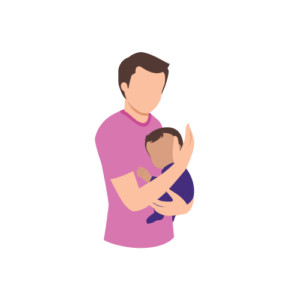One of the challenges of becoming a parent can be caring for a crying baby. Your brain is designed to find your baby’s cry uncomfortable. This is nature’s way of telling us to try and cuddle, comfort and calm your baby. Know that your baby isn’t trying to punish you, or that you aren’t a good enough parent. Lots of parents have these worries. Crying is your baby’s way of communicating with you. It can be helpful to think about your baby’s cry as them trying to talk to you.
They may be trying to tell you they need a feed or a cuddle, or have a dirty nappy, trapped wind, or feel too hot or too cold.
Sometimes babies continue to cry even after you have checked these basics. Try to stay calm and reassure yourself that you are trying your best. You can learn more about why babies cry and how to soothe them at NHS.uk.
 There may be times of the day when your baby tends to cry a lot and cannot be comforted. Early evening is the most common time for this to happen. This can be hard for you, as it's often the time when you're most tired and least able to cope. The amount babies cry tends to start increasing at two weeks and peaks at about seven weeks, then gradually tails off.
There may be times of the day when your baby tends to cry a lot and cannot be comforted. Early evening is the most common time for this to happen. This can be hard for you, as it's often the time when you're most tired and least able to cope. The amount babies cry tends to start increasing at two weeks and peaks at about seven weeks, then gradually tails off.
The period of ‘purple crying’ is a concept that can help parents understand this time in their baby's life. This stage begins at about two weeks of age and continues until about three to four months of age. It is during this time that some babies can cry a lot and some far less, but they all go through it. This website is fantastic for techniques to help with this and also some reassurance that, although upsetting for parents, this is a normal phase.
Getting help with a crying baby
 If you feel overwhelmed, put your baby in a safe space and walk away for a few minutes to allow yourself to calm down. No matter how frustrated you feel, you must never shake your baby. Shaking moves their head violently and can cause brain damage.
If you feel overwhelmed, put your baby in a safe space and walk away for a few minutes to allow yourself to calm down. No matter how frustrated you feel, you must never shake your baby. Shaking moves their head violently and can cause brain damage.
ICON has lots of information and videos about crying and ways to calm a baby down that you can share with anyone caring for your baby including grandparents or your partner.
ICON stands for:
- I – Infant crying is normal
- C – Comforting methods can help
- O – It’s OK to walk
- N – Never, ever shake a baby.
Reach out for support if you are struggling to cope with your baby’s crying. Talking to family, friends, your midwife, GP or health visitor can be reassuring and they can offer support.
If you’re looking for more support, you could watch our ‘Crying baby’ narrated presentation.
Older babies and toddlers may cry if you or their other carers leave them, even for a short period of time.
Separation anxiety and a fear of strangers is common from six months to three years of age. This is a normal part of child development and your child will usually grow out of it.
From around six months, babies understand who their main carers are and have formed strong attachments to them. This can include parents, grandparents or professionals involved in their care. They become more aware of their surroundings and can sometimes feel unsafe in new situations or with new people, even if you are with them. Separation anxiety is your baby realising how dependent they are on their main carers to feel safe.
NHS.uk has some information on coping strategies with some useful tips on how to cope.
Creating a stable and loving home environment will help your child to feel safe. Sometimes families can go through a period of stress and despite how hard parents try to hide this from their child, your child may still be aware of the tensions around them. If you require any support please contact your local Health Visiting Team who’ll be able to support and guide you to other services to help you through what difficulties you may be experiencing.
Experiences that we have in our early lives, particularly early childhood can impact on how we develop and grow, our mental and physical health and our thoughts, feelings and behaviour. If we experience Adverse Childhood Experiences (ACEs) and poor attachment in our early lives it can have a negative impact on our future relationships and our mental and physical wellbeing. If you require any support you can contact your GP, health visitor, or Early Help Team.
Useful resources
- Cry-sis: Support for crying and sleepless babies provides a helpline free on 0800 448 0737. It's open 9am to 10pm, 7 days a week
- ICON Cope: Helping people who care for babies to cope with crying
- Families in Kent and Medway can access free online courses. The ‘Understanding your baby’ course is here to help you develop as a parent as your family grows. These free online courses are available in 15-20-minute chunks, perfect for busy parents and carers. Use the access code Invicta to register for your free account.
Page last reviewed: 01/05/2025, next review due: 01/01/2028